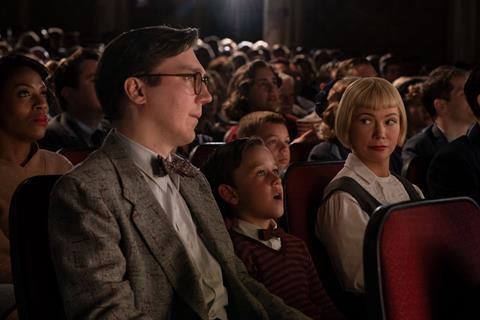Steven Spielberg’s latest film is a fictionalised account of his early life. Giles Gough takes a look at the childhood that shaped a Hollywood legend, and the faith themes contained in the movie

Whether you find him sincere or saccharine, Steven Spielberg is a true Hollywoood legend, directing some of the biggest films of the past four decades. So it’s with more than a little curiosity that we get to sneak a peek at the childhood that defined the man who has (arguably) defined cinema for a generation.
And anyone thinking that a story centred on a largely secular, Jewish protagonist has little relevance to a Christian audience would be sorely mistaken.
Set in the 50s and 60s, The Fabelmans is Spielberg’s fictionalised memoir. It follows Sammy Fabelman as he discovers and falls in love with cinema, while his parents’ marriage slowly drifts onto the rocks. Whether it works as a film is up for debate but, as it is clearly his most personal work to date, the chance to sit in on Spielberg’s public therapy session is hard to pass up.
For any biopic to work, complex events need to be compressed, characters need to be combined and the truth sometimes needs to be compromised
The film opens in 1952, with a young Sammy being taken to ‘the pictures’ to see Cecile B. DeMille’s The Greatest Show on Earth. Sammy is nervous about being in a dark room, surrounded by strangers, but his parents comfort him. His father gives him a soft-but-scientific explanation of how motion pictures work. When that doesn’t do the trick, his mother simply tells him: “It’s magic!”
A look into the past
The performance getting most attention is Michelle Williams’ portrayal of Mitzi, Sammy’s adventurous yet fragile mother who gave up her dream of being a concert pianist when she became a mother. While her poor mental health may have had deeper roots, looking after four kids, being married to a workaholic and having your dreams frustrated in 1950s America would be enough to cover anyone in the fog of depression.
In recent years, Williams has become something of an indie darling, winning awards for her roles in Blue Valentine and Manchester By The Sea. But die-hard Dawson’s Creek fans might smile at the thought of Jen, the sometime love-interest of Spielberg-obsessed Dawson, now playing Spielberg’s mother.
Paul Dano’s Burt Fabelman is an understated portrayal of a man trying to prepare his eldest child for adulthood while desperately trying to hold his family together. Burt struggles to see the importance of Sammy’s love for filmmaking, absent-mindedly calling it a ‘hobby’, which sparks conflict with his teenage son.
Clearly a genius, Burt is working on computers decades earlier than anyone else. (During a recent stint on Desert Island Discs, Spielberg reveals that his father was personally thanked by Bill Gates for his invention of the ‘235’, a computer that Gates credits with giving him the idea for Windows).
His genius is touchingly portrayed in the film, and often takes a back seat to how loving he is as a father. When Burt finally lets Sammy follow his movie dreams, he tells him not to worry, saying: “We’re never not going to know each other, Sammy”. Not only does this line offer closure to Spielberg himself, it gives us an echo of the Father’s heart.
Troubled teens
The film’s most troubling scenes arise when the Fabelmans move to northern California. Starting a new school, Sammy is confronted by a streak of vicious anti-Semitism from two boys who pick on him casually, but relentlessly. Hanging bagels in his locker and accusing him of killing Christ, Sammy is subjected to a verbal and physical violence that goes unchecked by the teachers.
God’s call is almost impossible to ignore, and it might just tear you apart if you try
This chapter is quickly followed by an awkward depiction of Sammy’s first romantic relationship with Monica, an evangelical Christian whose interest in Sammy is piqued when she finds out he’s Jewish.
One memorable scene shows Sammy in Monica’s bedroom, asking Jesus to come into his heart as a precursor to them making out. Hilarious, uncomfortable and maybe all too familiar to those of us who found faith in our teens, and were frequently torn between the desire to follow Jesus and other, more worldly desires.
A higher calling
The film’s most enduring faith parallel is also its most understated. Sammy needs to follow his dream; he needs to make films. Having a dream for your life and a calling from God are almost two ways of saying the same thing. God’s call is almost impossible to ignore, and it just might tear you apart if you try and pretend it’s not there.
It also speaks to our relationship with our earthly parents, and the parallels that presents to our relationship with God the Father. When his parents divorced, Spielberg didn’t speak to his father for 15 years, despite it being his mother’s infidelity that ended the marriage.
The Fabelmans reminds us that our parents aren’t perfect, and that many can be loving, supportive, dismissive or even abusive in the same breath. Many of us come to God looking for a parental figure who, unlike our earthly parents, will not let us down. In Sammy’s flawed relationship with his own parents, we are reminded of the unconditional love we can only really find in Christ.
Spielberg’s decision to shoot a fictionalised version of his early life is perhaps, paradoxically, more honest because of it. For any biopic to work, complex events need to be compressed, characters need to be combined and the truth sometimes needs to be compromised. By making it fictional, Spielberg gets to tell this fable without worrying about whether the details match for the other cast members of his early life.





































1 Reader's comment